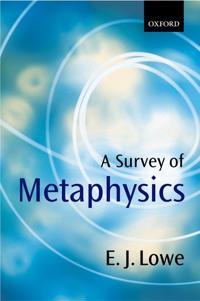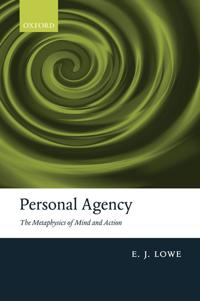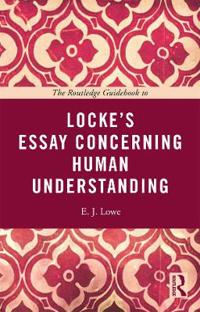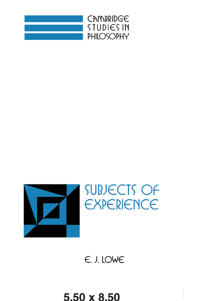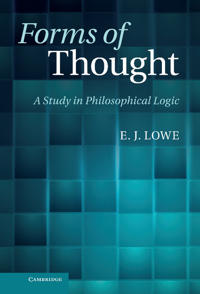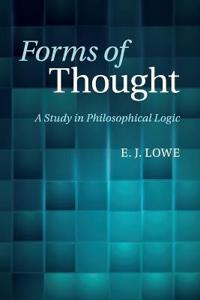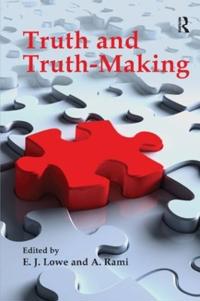A Survey of Metaphysics (Häftad)
avE. J. Lowe
ISBN: 9780198752530 - UTGIVEN: 200201A Survey of Metaphysics provides a systematic overview of modern metaphysics, covering all of the most important topics likely to be encountered on a metaphysics course. The conception of metaphysics underlying the book is the fairly traditional and widely-shared one that metaphysics deals with the[...]
Personal Agency (Häftad)
avE. J. Lowe
ISBN: 9780199592500 - UTGIVEN: 2010-10Personal Agency consists of two parts. In Part II, a radically libertarian theory of action is defended which combines aspects of agent causalism and volitionism. This theory accords to volitions the status of basic mental actions, maintaining that these are spontaneous exercises of the will-a 'two-[...]
Locke (Pocket)
avE. J. Lowe
ISBN: 9780415283489 - UTGIVEN: 2005-04-18In this introduction to Locke's thought, EJ Lowe covers all the major aspects of his philosophy. He concentrates on introducing and assessing Locke in a contemporary philosophical setting, explaining why he is so important today.[...]
The Routledge Guidebook to Locke's Essay Concerning Human Understanding (Häftad)
avE. J. Lowe
ISBN: 9780415664783 - UTGIVEN: 2013-01John Locke is widely acknowledged as the most important figure in the history of English philosophy and An Essay Concerning Human Understanding is his greatest intellectual work, emphasising the importance of experience for the formation of knowledge. The Routledge Guidebook to Locke's Essay Concern[...]
Subjects of Experience (Häftad)
avE. J. Lowe
ISBN: 9780521031554 - UTGIVEN: 2006-11In this innovative study of the relationship between persons and their bodies, E. J. Lowe demonstrates the inadequacy of physicalism, even in its mildest, non-reductionist guises, as a basis for a scientifically and philosophically acceptable account of human beings as subjects of experience, though[...]
An Introduction to the Philosophy of Mind (Häftad)
avE. J. Lowe
ISBN: 9780521654289 - UTGIVEN: 2000-01In this book Jonathan Lowe offers a lucid and wide-ranging introduction to the philosophy of mind. Using a problem-centred approach designed to stimulate as well as instruct, he begins with a general examination of the mind-body problem and moves on to detailed examination of more specific philosoph[...]
Forms of Thought (Inbunden)
avE. J. Lowe
ISBN: 9781107001251 - UTGIVEN: 201304Forms of thought are involved whenever we name, describe, or identify things, and whenever we distinguish between what is, might be, or must be the case. It appears to be a distinctive feature of human thought that we can have modal thoughts, about what might be possible or necessary, and conditiona[...]
Forms of Thought (Häftad)
avE. J. Lowe
ISBN: 9781107540439 - UTGIVEN: 2015-06Forms of thought are involved whenever we name, describe, or identify things, and whenever we distinguish between what is, might be, or must be the case. It appears to be a distinctive feature of human thought that we can have modal thoughts, about what might be possible or necessary, and conditiona[...]
More Kinds of Being: A Further Study of Individuation, Identity, and the Lo (Häftad)
avE. J. Lowe
ISBN: 9781118963869 - UTGIVEN: 2015-02-28More Kinds of Being: A Further Study of Individuation, Identity, and the Lo (Inbunden)
avE. J. Lowe
ISBN: 9781405182560 - UTGIVEN: 2009-12-31Truth and Truth-making (Häftad)
avE. J. Lowe
ISBN: 9781844651450 - UTGIVEN: 2008-11Truth depends in some sense on reality. But it is a rather delicate matter to spell this intuition out in a plausible and precise way. According to the theory of truth-making this intuition implies that either every truth or at least every truth of a certain class of truths has a so-called truth-mak[...]

